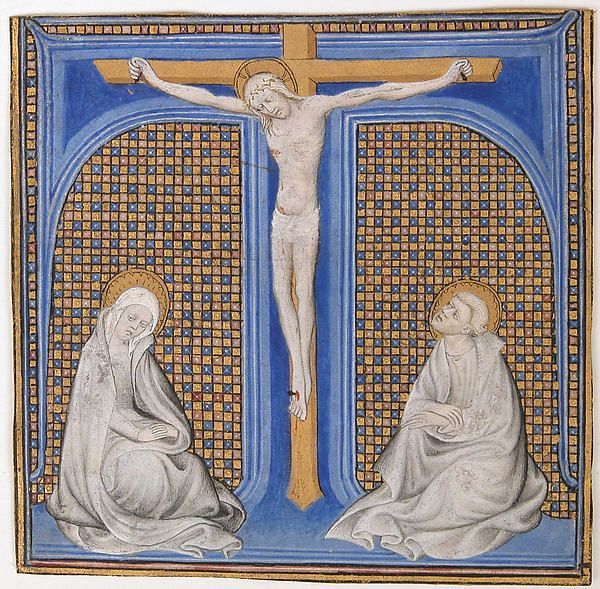The Incarnation
Prayer: In the preparatory prayer I will beg God our Lord for grace that all my intentions, actions, and operations may be directed purely to the praise and service of his Divine Majesty.
History: This will consist in calling to mind the history I have to contemplate. Here it will be how the Three Divine Persons look down upon the whole earth filled with human beings. Then, how they see that all are going down into hell and they decree in their eternity that the Second person should become man to save the human race. Finally, they send the Angel Gabriel to our Lady.
Composition of place: it will be to see the house and room of our Lady in the city of Nazareth in the province of Galilee.
Prayer of petition: I will ask for the grace I desire. Here it will be to ask for an intimate knowledge of our Lord, who has become man for me, that I may love him more and follow Him more closely. So, we are asking for an imitative knowledge, knowledge that is accompanied by love.
The Incarnation, central event of the whole universe
The Incarnation is the great landmark that divides the history of mankind into two periods. The first period was a period of preparation and expectation. The Incarnation marks the beginning of the second period.
Everything finds its reason in the Incarnate Word. And “it is only in the mystery of the incarnate Word that the mystery of man truly becomes clear.” (GS 22)
The line of division between men is not chronological, but we may say, Christological. Man without Christ and man with Christ.
Humanity before the Incarnation
Before the coming of the Messiah, who loved God upon earth? Hardly was he known in a corner of the world that is Judea; and even there, how very few people loved him!
Some worshipped the sun, some others worshipped animals, some the very stones.
After the original sin, all mankind together was condemned to live a life of misery on the earth, and a terrible death, separate from God.
“And since they did not see fit to acknowledge God, God gave them up to a base mind and to improper conduct. They were filled with all manner of wickedness, evil, covetousness, malice. Full of envy, murder, strife, deceit, malignity, they are gossips, slanderers, haters of God, insolent, haughty, boastful, inventors of evil, disobedient to parents, foolish, faithless, heartless, ruthless. Though they know God’s decree that those who do such things deserve to die, they not only do them but approve those who practice them.” (Rom 1: 28-32)
Therefore, in all ages, the fulfillment of the Messiah’s promise was expected. This Messiah, this Savior that was pre-announced by God in Paradise, when God said to the devil, “I will put enmity between you and the woman, and between your seed and her seed; he shall bruise your head, and you shall bruise his heel.” (Gen 3: 15)
The Decree of Redemption
The Lord said, “I will not lose man; let there be found a Redeemer who may satisfy my justice on behalf of man, and so rescue him from the hands of his enemies and from the eternal death due to him.”
Saint Bernard, in his contemplation on the Incarnation, imagines a struggle between the justice and the mercy of God.
Justice says: “I no longer exist if Adam be not punished; I perish if Adam die not.”
Mercy, on the other hand says: “I am lost if man be not pardoned; I perish if he does not obtain forgiveness.”
In this contest, the Lord decides that in order to deliver man, who was guilty, some innocent one must die for him.
On earth, there was not one innocent. Then, the Eternal Father says, “Since amongst men there is none who can satisfy my justice, let him come forward who will go to redeem man.”
The angels, cherubim, seraphim, all are silent, not one replies. One voice alone is heard, the voice of the Eternal Word, who says, “Behold, here I am, send me.”
“Father,” says the only begotten Son, “your Majesty, being infinite, and having been injured by man, cannot be satisfied by an angel, who is a creature… I, your Son should go upon earth, should there assume human flesh, and pay by my death the penalty due to him… In this way your Justice will be fully satisfied, and at the same time will be convinced of our Love…
But the Father answered:
Think that you will have to live a life full of suffering… – Here, I am …Send me…
Think that you will have to be born in a cave; you must flee into Egypt; later in Palestine you will have to live a simple boy’s life in a carpenter’s shop… – Here, I am… Send me…
Think that only few will follow you; think that you will be despised and they will call you impostor, magician, foolish, son of the devil… – Here, I am… Send me…
Think that they will persecute, insult, hit and finally kill you. – Here, I am… Send me…
Then the decree was sealed: “Let us work the redemption of the human race, the Divine Son should be made man, and so become the Redeemer of humanity.
The Annunciation
“The angel Gabriel was sent from God to a city of Galilee named Nazareth, to a virgin betrothed to a man whose name was Joseph, of the house of David; and the virgin’s name was Mary.” (Lk. 1: 26-27)
The story of our fall begins with the words of an angel; a fallen angel speaks to a virgin in Eden.
The story of our redemption begins with the words of an angel to a virgin in Nazareth.
Saint Luke tells us how the angel Gabriel stood before Mary – then a girl fifteen years old-
And the Angel said, Hail, full of grace, the Lord is with you…
Then, the angel announced to her that God wished to associate her in his Redemption. And her answer, Behold the handmaid of the Lord, be it done unto me according to your word. (Lk. 1: 38)
The virgin gave her “yes” as a servant: I am the handmaid of the Lord, and then the Word took the form of a servant, being born in the likeness of men. (Phil 2: 7)
“And the Word was made flesh.” (John 1, 14)
Now, Jesus is in the womb of Mary, with all humility and obedience.
Then, we can say that, “He emptied Himself” (Philippians 2)
Saint Thomas Aquinas exclaims, “How beautiful to say that He emptied himself, for the empty is opposed to the full! The divine nature is sufficiently full, is the highest perfection… but the human nature is not full, but capable of fullness. Then, He empty Himself when He took a human nature.”
From the womb of Our Lady he prays to the Father, “My Father… man cannot make satisfaction to your offended justice by their works and sacrifices. Behold me, your Son, now clothed in mortal flesh, behold me ready to give you in their stead satisfaction with my sufferings and with my death!”
“Sacrifices and offerings you did not desire, but a body you prepared for me; holocausts and sin offerings you took no delight in. Then I said, ‘As is written of me in the scroll, Behold, I come to do your will, O God’.” (Heb 10: 5-7)
“And the Word was made flesh.” (John 1, 14)
The Word became flesh so that we might know God’s love:
“In this the love of God was made manifest among us, that God sent his only Son into the world, so that we might live through him.” (1 John 4: 9)
Saint Bernard says, that from the beginning of the world had been seen the power of God in the Creation, and his Wisdom in the government of the world; but only afterwards, in the Incarnation of the Word, was seen how great was his mercy. (In Nat. D. s.1)
Saint Augustine says, “Look then, O man, your God is made your brother, he has put on your selfsame flesh. He has made Himself liable to suffer and to die as you are.”
And he exclaims, “Desire something better… what else!” “God is made your brother…”
This love of Christ, Saint Paul cries out, “impels us to love him. – Caritas Christi urget nos” (2 Cor. 5: 14)
Whosoever loves, has no other end in loving than to be loved again. So, Saint Bernard remarks, “When God loves, he desires nothing else than to be loved.” (In Cant, s. 83)
The Word became flesh to be our model of holiness:
“Take my yoke upon you, and learn from me.” “I am the way, and the truth, and the life; no one comes to the Father, but by me.” (Mt 11: 29; John 14: 6) Jesus is the model for the Beatitudes and the rule of the new law: “Love one another as I have loved you.” (John 15:12) this love means knowledge of him, but above all, this love means imitation.
The Word became flesh to make us “partakers of the divine nature” (2 Pt 1: 4)
“For this is why the Word became man, and the Son of God became the Son of man: so that man, by entering into communion with the Word and then receiving divine sonship, might become a son of God.” (Saint Irenaeus, Adv. Haeres. 3, 19)
“The only-begotten Son of God, wanting to make us sharers in his divinity, assumed our nature, so that he, made man, might make men gods.” (St. Thomas Aquinas, Opuscu. 57: 1-4)
Colloquy
I will think over what I have to say to the three Divine Persons, or to the Eternal Word Incarnate, or to his Mother, Our Lady.
According to the light that I have received, I will beg for grace to follow and imitate more closely our Lord, who has just become man for me.
Close with an Our Father.

Take, Lord,
and receive all my liberty, my memory, my understanding, and my entire will, all that I have and possess. Thou hast given all to me. To Thee, O Lord, I return it. All is Thine, dispose of it wholly according to Thy will. Give me Thy love and Thy grace, for this is sufficient for me.
(Spiritual Exercises #234. Louis Puhl SJ, Translation.)




